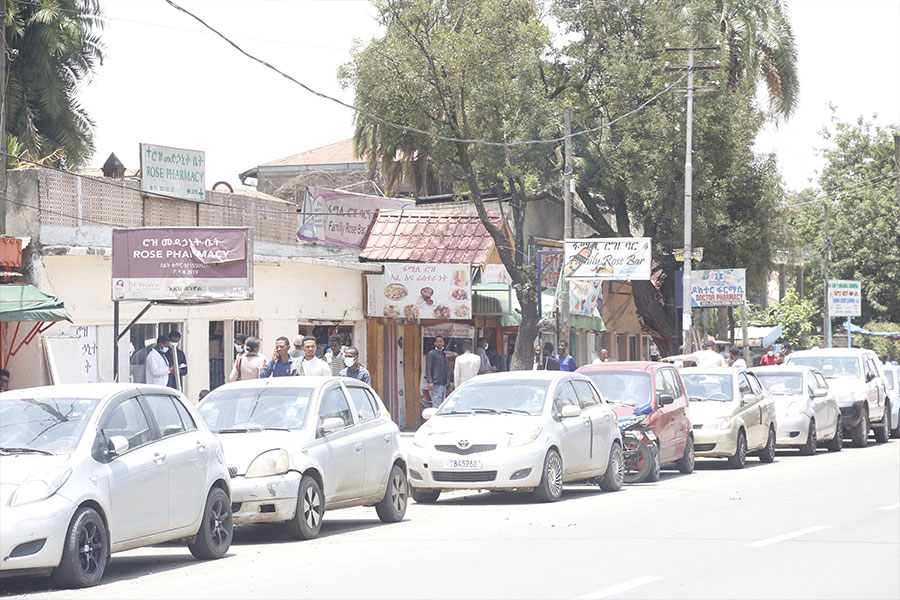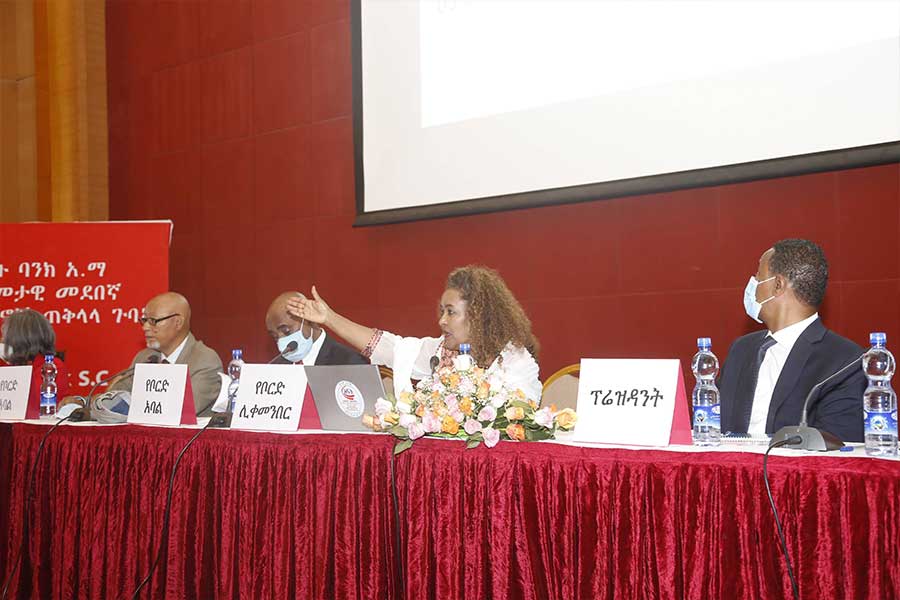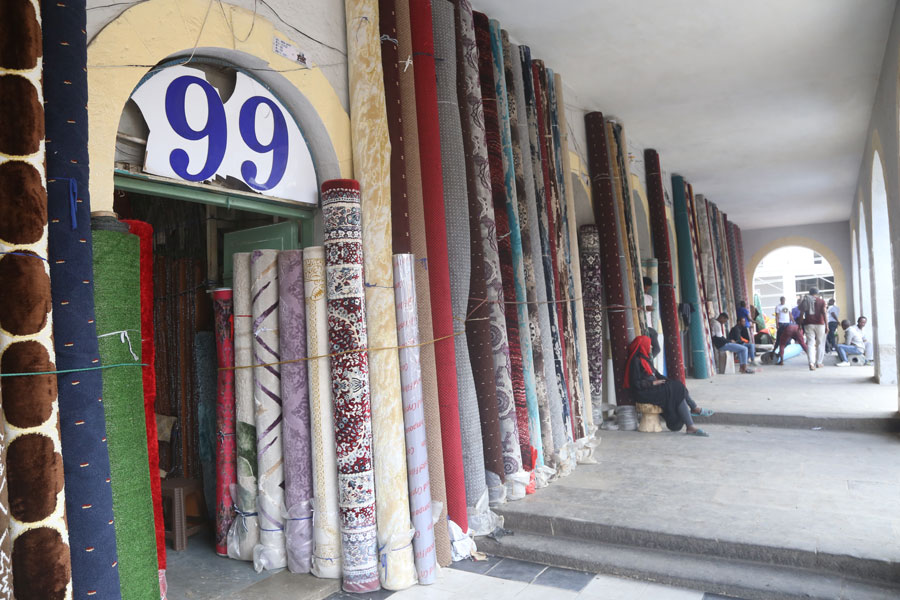
In the mid-afternoon of Wednesday, March 18, 2020, Kenema Public Pharmacy, located around the stadium near Ghion Hotel was busy serving people from all walks of life, from teenagers to the elderly. The pharmacists, sporting face masks and gloves, were very busy. They did not have time to look up at anyone.
The road in front of the pharmacy was filled with people waiting for their turn to buy face masks, sanitizer, alcohol and gloves after cases of Novel Coronavirus (COVID-19) were reported in the capital, Addis Abeba.
Tadesse Feyisa, the 43-year-old taxi driver, who wore a face mask to protect himself from possibly catching the virus from the many people he serves daily, was among those who lined up at the pharmacy.
“I'm here to buy alcohol to clean the doors of my taxi, but if I can’t get alcohol, I will buy sanitizer,” said Tadesse. “I have noticed that over the past weeks the prices of health care products has shot up."
As the sudden storm of Coronavirus has spread around the world, businesses such as hotels, restaurants, bars, cinemas and gyms in Addis Abeba are closing or slowing down, while businesses like grocery stores and pharmacies are making a profit.
After the committee that was formed to control the outbreak announced on March 16, 2020, the cancellation of large public gatherings including the closure of sports activities, cinemas and all schools except public universities for two weeks, the income of businesses like hotels, bars, restaurants and gyms began to decline.
Among the many international hotels in the capital, Jupiter International Hotel with two branches at Kazanchis and Bole is one such business affected by the virus.
The hotel started to observe a decline in business when the virus spread from China to Europe, as 90pc of its customers are international guests, according to Assefa Belay, food and beverage director at the Hotel.
“As of March 2, activity at the Hotel has been slowing down," he said. "I witnessed it is affecting the industry and economy."
The Hotel has decided to stop giving massage services temporarily since it demands physical contact with another person.
After Ethiopia reported the first confirmed COVID-19 case, a 48-year-old Japanese individual, on March 13, 2020, many activities in the capital were disrupted. The effect on the economy is visibly obvious.
Only 50pc of the 102 rooms at the Kazanchis branch of the Hotel were occupied between March 1 and March 19, a significant decrease from the 71pc occupancy rate reported at this same time last year.
The hotel posted precautionary guidelines in four languages on its website to create awareness among customers and the hotel staff and made no price adjustments to its services.
Taitu, a favorite hotel with foreigners visiting Ethiopia and a popular destination for locals during the fasting season, has seen fewer customers.
One of the garlic outlets in the vegetable market of Atkilt Tera, where some vendors are selling garlic for three-fold the normal price.
Another business that has been affected by COVID-19 is Bole Rock Wellness Center, which was forced to shut its doors.
The Center posted an announcement on its front door notifying customers that it will be closed for fifteen days. There was also a guard holding clients back from entering the venue notifying them that the Center was closed.
Wondwosen Getachew, the general manager of the Center, was standing outside at the front door engaged in a phone conversation.
The Center, which was founded with eight million Birr capital 12 years ago and located 2.5Km away from Bole International Airport around Bole Medhanealem Church at the side of Golden Tulip Hotel, offers a gym, indoor swimming pool, steam and sauna bath, traditional dance classes, modelling classes, and a kick-boxing arena among other services.
“We're completely out of work,” said Wondwosen, who was told by the government to stop serving customers for fifteen days. “We're forced to give annual leave to our 105 employees."
According to Wondwosen, the Center will lose about two million Birr within the coming two weeks. It typically serves up to 500 people a day at the swimming pool; however, only 50 people a day visited the pool after March 16, 2020. The gym is typically used by 400 people a day but served only 100 a day after COVID-19 was reported in Addis Abeba.
Not only Bole Rock but Alem Fitness Center, located on Bole Road, has also been affected by the virus.
“Usually, at the fasting season, the flow of our customers increases, but now the opposite is happening,” said Elias Yosef, manager of the gym who has been working there for almost 18 months.
Since last week, their business has slowed down because of the outbreak of the Coronavirus, which originated in Wuhan, China and has spread across the globe.
The first case of the virus was reported on December 31, 2019, and since then it has infected 234,073 people, 79,00 of whom have recovered, while 9,840 have died as of March 19, 2020, according to the World Health Organization (WHO).
“I have never experienced this kind of incident before. We already lost our customers due to the virus,” said Elias, who served at least 100 people a day before the virus was introduced. Now the Center is serving 30 people a day.
“We are having second thoughts about closing the centre," he said. "We have to consider our customers with health issues that consistently use our services."
There are 158 countries that have reported COVID-19 cases so far. Ethiopia has reported nine cases as of this writing. Three Ethiopians are infected, as well as four Japanese citizens, one Australian citizen, and one British citizen.
Tadesse, who has been a taxi driver for 14 years heard that garlic, ginger and lemon are used by a lot of people as a traditional medicine to protect themselves from the Coronavirus.
At 11:00am on March 17, 2020, a bright and sunny day, Addis Abeba’s main vegetable market Atkilt Tera was flooded with people who were buying garlic, ginger and lemon to take as medication to prevent the Coronavirus.
Hewan Frework, 34, was among the crowd who were buying the commodities from Atkilt Tera to protect her family from the virus.
Hewan, a mother of two children, witnessed the increasing price of garlic, ginger and lemon, which are traditionally believed to be medication for bacteria and viruses.
Ethiopia is the third East African nation to report the arrival of the virus. Residents were deeply concerned by the sudden announcement from Health Minister Lia Tadesse (MD).
“Me and my husband were disturbed after we heard that Coronavirus had come to Ethiopia,” said Hewan, who bought garlic, lemon and ginger, one kilogram of each, for 220 Br, 180 Br and 80 Br, respectively, which she used to buy for 120 Br, 80 Br and 30 Br from the same shops in Atkilt Tera.
Over the past week, there were a lot of customers buying unnecessary amounts of food and hygiene items to stock at their homes,” according to Serkalem Kassa, assistant manager at Shoa Supermarket, Piassa branch.
“We had to restrict the number of supplies that are bought to ensure the availability of the items for the larger community,” he adds.
Tewdros Gossay, who runs his family business in Atkilt Tera, also witnessed the rising prices of garlic, lemon, and ginger.
”The demand for garlic, lemon and ginger drove the prices for the products up,” said Tewdros.
After the virus reached the country, the price for these commodities has increased by three-fold, benefiting grocery store owners.
By last Friday, the Ministry of Trade & Industry punished 91,739 grocery stores, cereal shops, and pepper shops in the country for selling goods and commodities at inflated prices, according to Eshete Assfaw, state minister for Trade & Industry.
“This is a serious natural disaster, I don’t think a lot of people are seeing it as such, because there are no winds and floods, but this is a real natural disaster that’s affecting people at the most basic level,” said Hewan, complaining about the price inflation of health care products.
There were some pharmacies in the capital that were selling health care products including gloves, alcohol and face masks at inflated prices.
The government has taken action against several of these pharmacies, which were selling gloves and face masks for 300 hundred Br each, far more than the normal prices of two Birr and 0.75 Br, respectively, according to a pharmacist at Kenema Pharmacy.
The Ministry of Trade & Industry has banned and warned 53,126 businesses from Amhara, 14,961 from Oromia, 6,320 from SNNPR and 17,182 from Addis Abeba that were allegedly engaged in illegal trade practices. The Ministry also punished 12, 150 and 13 businesses from Somalia, Benshagul Gumz and Dire Dawa, respectively.
Throughout the world, healthcare workers rely on personal protective equipment to protect themselves and their patients from being infected and infecting others. However, limited access to supplies such as gloves, medical masks, respirators, goggles, face shields and gowns leave doctors, nurses and other front line workers dangerously ill-equipped to care for COVID-19 patients.
The government allocated 300 million Br for fighting Coronavirus, while the World Bank has pledged 121 million dollars for Ethiopia out of its global allocation of 12 billion dollars to combat the pandemic, according to Seharela Abdullah, state minister for Health.
In addition, the Commercial Bank of Ethiopia (CBE) also pledges 10 million Br for the Ministry of Health, joining the national effort to contain the spread of the virus. The Ethiopian Public Health Institute (EPHI) has deployed 200 medical staff to conduct tests on passengers, especially those who arrive from countries that are infected by the virus.
The Institute has established national emergency centres at Ethiopian Airlines, Tikur Anbessa, St. Paul and Yeka-Kotebe hospitals where suspected patients will be kept in isolation.
Out of the total 342 people that have been analysed by the COVID-19 laboratory at the public health institute, 119 were suspected and nine turned out to be positive. The 231 people who are known to have had close contact with the infected individuals have tested negative.
Currently, 241 people who came in contact with infected individuals and 1,444 travellers are under a follow-up observation period, as of March 20, 2020, according to Mesfin Wossen, acting director of disease surveillance and response at the Institute.
Patients infected with the virus experience fever, cough and shortness of breath. Avoiding close contact with people suffering from acute respiratory infections, washing hands with soap and water for at least 20 seconds, and avoiding touching eyes, nose and mouth with unwashed hands are the major preventive measures to halting the spread of the respiratory virus.
The virus is already affecting the global economy. The United Nations Economic Commission for Africa (UN-ECA) announced the postponement of all public meetings, including the 2020 Conference of Ministers of Finance, Planning & Economic Development Conference and international sports events.
As a result of the sudden virus, demand for many goods and services will plummet, meaning less production and fewer transactions. All businesses will be directly affected by the Coronavirus, according to Atlaw Alemu (PhD), a lecturer at Addis Abeba University’s Faculty of Business & Economics.
For Atlaw, the awareness created by the government is not adequate and the public still is not following the guidelines.
“Since businesses of international hotels depend on customers from foreign countries," said Atlaw, "the situation will lead to the increase of their debts and as a result, they might be forced to lay off their employees."
The government and banks should collaborate with private businesses by easing interest on loans and taxes, he recommends.
If the public implements the guidelines the Ministry of Health and the expert are recommending, the virus can be controlled, Assefa hopes.
PUBLISHED ON
Mar 21,2020 [ VOL
20 , NO
1038]

Fortune News | May 17,2025

Agenda | Aug 14,2021

View From Arada | Nov 12,2022

Commentaries | Jan 13,2024

Featured | Apr 22,2023

Life Matters | Dec 10,2022

Fortune News | Dec 26,2020

Agenda | Nov 05,2022

Fortune News | Apr 24,2021

Editorial | Jul 09,2022

Dec 22 , 2024 . By TIZITA SHEWAFERAW
Charged with transforming colossal state-owned enterprises into modern and competitiv...

Aug 18 , 2024 . By AKSAH ITALO
Although predictable Yonas Zerihun's job in the ride-hailing service is not immune to...

Jul 28 , 2024 . By TIZITA SHEWAFERAW
Unhabitual, perhaps too many, Samuel Gebreyohannes, 38, used to occasionally enjoy a couple of beers at breakfast. However, he recently swit...

Jul 13 , 2024 . By AKSAH ITALO
Investors who rely on tractors, trucks, and field vehicles for commuting, transporting commodities, and f...

Jun 28 , 2025
Meseret Damtie, the assertive auditor general, has never been shy about naming names...

Jun 21 , 2025
A well-worn adage says, “Budget is not destiny, but it is direction.” Examining t...

Jun 14 , 2025
Yet again, the Horn of Africa is bracing for trouble. A region already frayed by wars...

Jun 7 , 2025
Few promises shine brighter in Addis Abeba than the pledge of a roof for every family...